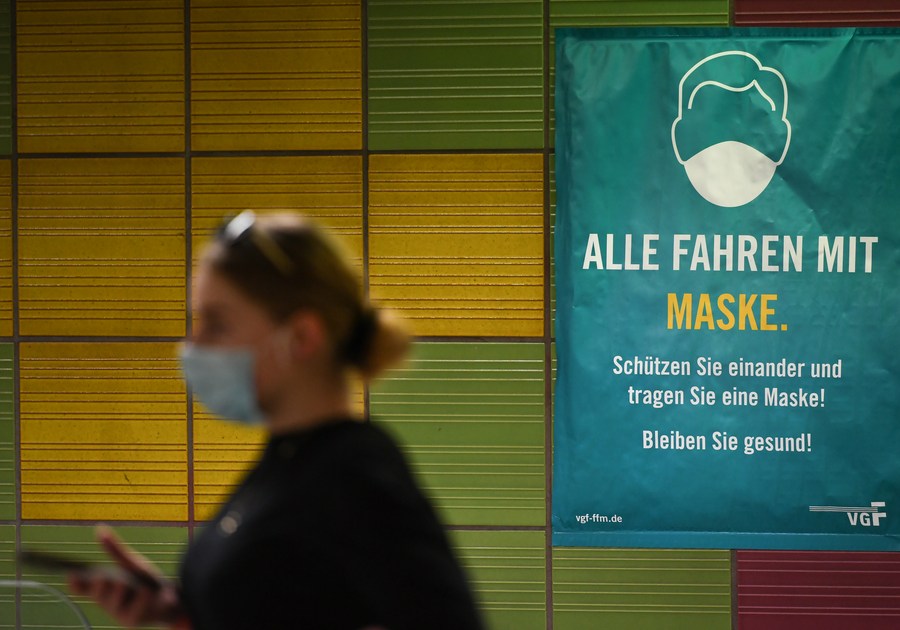How individualism trumped the common good on mask wearing
- By Tom Fowdy
 0 Comment(s)
0 Comment(s) Print
Print E-mail China.org.cn, September 20, 2020
E-mail China.org.cn, September 20, 2020

The spread of the COVID-19 pandemic throughout the world has induced a tidal wave of political, economic and social upheavals. There are few people who can say right now that their lives have not been affected personally in some way, with the virus having forcefully re-written social rules and conduct as we know them.
In Western countries in particular, this has proved to be a bigger shock to the system, whereby people have had to come to grips, either willingly or unwillingly, with concepts and expectations such as wearing masks in public.
Not all have taken kindly to it, with anti-mask protests proliferating in locations throughout Europe and the United States. Those opposed to wearing face coverings have not only sought to downplay the severity of the virus and the potential benefits of doing so, but have also argued that such rules as imposed by governments represent an infringement upon individual liberty and choice.
These debates have raged on for months, and seen many governments subsequently drag their feet on the imposition of a mandatory mask requirement before they recognized it was a common good.
This behavior contrasts sharply to countries within East Asia, whose people didn't think twice about donning masks and accepting isolation measures even when few realized just how serious the COVID-19 would be.
While I was in South Korea in late January, news emerged that a virus was circulating within neighboring China. There was no hesitation for mask wearing to become widespread in public, even long before the country battled the virus itself.
Likewise, the same pattern emerged in other countries in the region. Owing to the legacy of other viral outbreaks in the past, Asia knew what needed to be done.
In March, I had to return to England. At that point in time, nobody was wearing masks and the few who did so were subject to initially social stigma or surprise. The mentality was different and too relaxed for its own good.
Unlike East Asia, where potential pandemics are taken seriously and with caution, the West had long entrenched itself with a mindset that assumed disease outbreaks were only something that "oriental" and "backward" countries experienced, and that through their superior and "civilized" way of life, such an outcome in the West was unthinkable and illogical. Therefore, the idea and discipline of wearing masks in public was culturally alien.
The result of such complacency in many Western countries has led to them being struck by the virus far harder than they anticipated, and this outcome was compounded in nations where emphasis was placed on classical liberty and individualism, particularly the United Kingdom and the United States.
This made governments and the public at large reluctant to the idea of a lockdown and initially, disdainful towards the idea of wearing masks. Despite the pandemic having ravaged both countries and claimed an unacceptable number of lives, the authorities of the U.S. and the U.K. failed to push the idea of mask wearing, even as a recommendation, until as late as the summer.
Not surprisingly, some areas of society in Western countries have continued to express resistance or apathy to the idea of wearing a mask in public, with the subject becoming a huge controversy in the United States.
Those doing so have sought to place the liberty of the individual above the good of society as a whole, deliberately negating and ignoring the scientific benefits of doing so in containing the virus. Anti-mask protests have subsequently proliferated throughout countries in America, as well as in capitals of Europe.
The news of Western countries being struck by a second wave of the virus has not deterred this behavior, and nor has it even improved compliance towards social distancing in many areas.
This makes a stark contrast to Asia, which, as noted, has taken this issue seriously from the beginning. While the West grapples with renewed lockdowns and spikes in cases, life in China, the country whom they blamed as "responsible" for the virus because of their complacency, is back to normal.
As a result, as the months have gone by, the gap between China and Western countries in handling the virus has grown dramatically, and the claims that China "covered up" the extent of the virus initially have become less and less credible, even when it became clear how poorly the West has been in organization. Simple social practices such as the acceptance of wearing masks in public have made a dramatic difference in Asia and allowed life to recover faster.
On the other hand, as we are seeing with anti-mask protests and passive stubbornness from areas of society, the emphasis upon individualism in the West and an inability to put the greater good first is leading to a prolonging of the virus and a perpetual cycle of outbreaks. Social discipline and firm organization are ultimately needed to combat COVID-19, and that begins with simple things such as accepting the need to wear a mask in public, something which has undoubtedly delivered for the Chinese people.
Tom Fowdy is a columnist with China.org.cn. For more information please visit:
http://www.china.org.cn/opinion/TomFowdy.htm
Opinion articles reflect the views of their authors, not necessarily those of China.org.cn.
If you would like to contribute, please contact us at opinion@china.org.cn.






Go to Forum >>0 Comment(s)